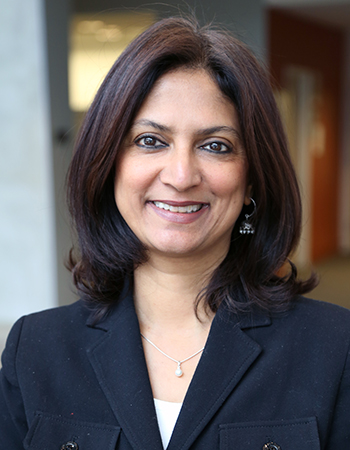The Lurie Institute for Disability Policy, headed by Director Monika Mitra, will become the new home of the Community Living Policy Center (CLPC), a research initiative with the goal to improve policies and practices that promote community living outcomes for people with disabilities in the United States. CLPC Principal Investigator (PI) Monika Mitra is joined by two co-PIs: Lurie Institute senior scientist Joe Caldwell, and Steve Kaye of the University of California at San Francisco (UCSF).
The CLPC is funded by a five-year, $4.375 million grant from the National Institute on Disability, Independent Living, and Rehabilitation Research (NIDILRR), a federal agency within the U.S. Department of Health and Human Services. This constitutes the single largest award that the Lurie Institute has received since it was established in 2007.
“This accomplishment reflects the Lurie Institute’s status as a major force in U.S. disability policy research,” says Heller Dean David Weil. “Under Monika’s guidance, the Community Living Policy Center will make critical contributions to this field and, by extension, positively impact the millions of people with disabilities in the U.S. who rely on support services to live in their communities.”
About 12 million people in the U.S. need long-term services and supports (LTSS). These include a wide range of health and social services provided to those who need help with personal care tasks or activities of daily living such as eating, bathing, and dressing; instrumental activities like grocery shopping or medication management; and supports to live and work in their community, including employment and housing services.
The Americans with Disabilities Act of 1990, and as reaffirmed by the 1999 Olmstead v. L.C. decision, established that individuals have the right to live in the most integrated setting appropriate to their needs. While a majority of people with LTSS needs wish to receive these services at home and in the community, significant challenges to community living remain.
“Even though we have these guarantees,” says Mitra, “institutional biases within programs, a severe lack of access to home and community based services, and other systemic biases often prevent people with disabilities from successfully living in the community. Approximately half of individuals currently in need of LTSS in the U.S. are under age 65. However, largely due to the aging Baby Boomer generation, LTSS needs are projected to rise dramatically in the coming decades, from 12 to 27 million individuals by 2050.”
Caldwell reinforces the need for this research, saying, “Individuals with disabilities and older adults want to age with dignity and respect. Unfortunately, our current long-term services and supports system forces individuals to impoverish themselves, is biased towards costly nursing home and institutional care, and does not meet their needs. The Community Living Policy Center will advance research, policy, and practices that promote community living and participation.”
In addition to conducting and synthesizing research on existing community-based services, the CLPC will examine barriers and facilitators to services and provide rapid analysis of community living policies and programs as they evolve.
Kaye, who had previously directed the CLPC at UCSF, says, “State Medicaid programs provide the bulk of paid LTSS in the United States, and we are particularly interested in what happens when states shift their LTSS programs into a managed care framework. In one project, we’ll investigate whether person-centered planning, in which the health plan tailors a person’s array of services to meet his or her goals for community living, results in better outcomes. We’ll also study innovative models of care coordination, and we’ll monitor the way states regulate service settings to avoid unnecessary segregation and isolation.”
A significant component of the CLPC is its commitment to knowledge translation and stakeholder involvement. For example, the CLPC will build capacity for the next generation of disability policy analysts and researchers by training master’s and doctoral students and postdoctoral researchers. Mitra and her team will also prioritize disseminating their research findings through partnerships with a broad network of disability organizations across the country.
The CLPC maintains active collaboration via strong partnerships with the Association of University Centers on Disabilities (AUCD), the Autistic Self Advocacy Network (ASAN), the Disability Rights Education and Defense Fund (DREDF), the Disability Policy Consortium (DPC), Centene Corporation, the National Association of States United for Aging and Disabilities (NASUAD), the Topeka Independent Living Resource Center, and national policy expert Henry Claypool. The CLPC will also be informed and advised by the Disability and Aging Collaborative, a coalition of approximately 40 national aging and disability organizations.
Mitra says, “Through the active involvement of key stakeholders, including individuals with disabilities, disability advocacy organizations, health plans, and states, in all center activities we will ensure the relevancy and usefulness of the CLPC.”
“People with disabilities, like everybody else, should have the supports to live and to thrive in their communities. We all need supports whether or not we like to admit it, or whether or not we see them as supports. The Community Living Policy Center will provide research, policy analysis, training, and information to ensure that people with disabilities receive the supports and services they need to live in their communities.”
The Lurie Institute for Disability Policy
The Lurie Institute, part of Brandeis University’s Heller School for Social Policy and Management, is dedicated to innovative research and training initiatives that promote effective policies to improve the health and well-being of people with disabilities and their families across the lifespan. The Lurie Institute’s research addresses many critical issues facing people with disabilities and their families including poverty, unemployment, inequitable access to and quality of care, and a myriad of other social, health, and economic disparities.

